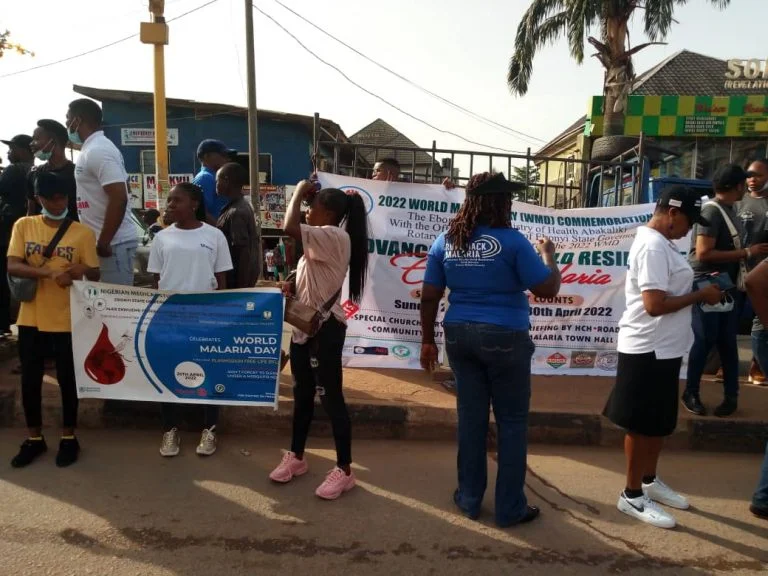The Ebonyi State Commissioner for Health, Dr. Daniel Umezurike, has identified some key issues militating against malaria vaccine development including the multifarious nature of the pathogen.
The expert spoke when he fielded questions during a world press briefing in commemoration of this year’s World malaria Day.
Umezurike, a Fellow of the West African College of Surgeons, spoke in Abakaliki, the Ebonyi State capital, on Wednesday.
He noted that vaccines were easier to develop for viral than protozoan diseases, which malaria belong to, adding that the parasite’s mobility in the body further makes it unpredictable.

Umezurike explained: “There are so many issues: one is that there are different types of Malaria, that is, the micro organism that causes it, of which the four major ones are Plasmodium malariae, Plasmodium ovale, Plasmodium falciparum and Plasmodium vivax.
“So the issue is that when you develop one vaccine, it cannot handle these different types.
“People have tried different vaccines, but it didn’t stand the test of time.
“But we hope that one day, all these issues would be sorted out and the vaccine would be developed.
“Also, let it be in the background of our mind that vaccines are easier to develop in some pathogens like viruses because what is used is life attenuated, that is you partially destroy the virus, and when it gets into the body, it generates a kind of immune reaction.
“And that immune reaction acts as resistance in the person’s body because he has an antibody antigen.
“That agent you are given is like the antigen, and when the body notices that there is something in it, it develops antibody, that is like giving resistance, trying to kill it, and also, developing memory such that any other time such agent cones to the body, it also attacks it and destroys it.
“But it is not like protozoan diseases, which sometimes do not have ready vaccines.
“The other thing is that malaria in the body goes to different locations: at one time, it is in the blood, another time in the liver and several other parts of the body.
“That also makes it more difficult to attack it with a vaccine.”
The Commissioner revealed that the State Government has received 2.08 million Long Lasting Insecticidal Nets for distribution to households in the State for the year 2022, courtesy of the President’s Malaria Initiative for States.
He advised all households in the State to ensure that they get enumerated and registered to be eligible to receive the nets, adding that one of the best ways to tackle malaria was to prevent mosquito bites by sleeping inside insecticidal nets.
Speaking on the theme for the year: “Advance Equity, build Resilience, End Malaria,” with the slogan: “Every Effort Counts,” the Director of Public Health in the Ministry, Dr. Hyacinth Ebenyi, and the State Coordinator of PMI for States, Dr. Grace Nwankwo, emphasised that in the fight against malaria, all hands must be on deck as everyone was an important stakeholder.
The state Net Ambassador, Chukwuma Elom, who represented the wife of the Governor, Rachael Umahi, lamented that the impact of malaria is often felt most in rural communities, especially among women and children.
He advised Ebonyi residents to always keep their environment clean to forestall breeding of mosquitoes.
Elom added: “The wife of the Governor appeals to all persons in the State to sleep inside insecticide treated nets, especially pregnant women and children.”
Meanwhile, in a goodwill message, the Acting State Coordinator, USAID-Breakthrough Action, Ifeoma Chris Okafor, appreciated the State Government for the enabling environment granted to partners to thrive.
Okafor emphasised that USAID-BAN, in commemoration of the event, has intensified its community engagements and communication strategies towards social behaviour change which was one of the major approaches to ending the malaria scourge.
World malaria day is observed on April 25 every year.
The weeklong activities for the year in Ebonyi State started on April 24 with an interdenominational church service held in Abakaliki.
It also featured Road walk/rally, community outreach programmes and malaria town hall meetings among others.
It was organized by the State Ministry of Health in conjunction with the office of the wife of the Governor, supported by partners such as USAID-Breakthrough Action, Nigeria; USAID/Integrated Health programme; PMI; AMURT; Roll Back malaria Initiative; and Rotary International.


